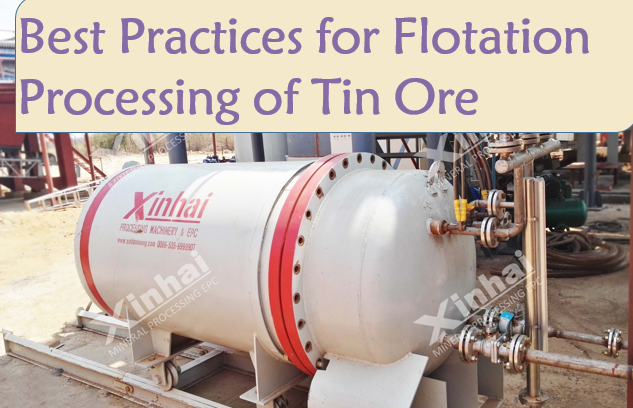Best Practices for Flotation Processing of Tin Ore
2024-12-30 Xinhai (1613)
2024-12-30 Xinhai (1613)
If you have any questions, please contact us through the following ways, we will give you more and better assistance!

The beneficiation process of tin ore is an important link in the mining industry. Through reasonable and efficient beneficiation processes, the recovery rate and product quality of tin ore can be greatly improved, while reducing production costs. Among many beneficiation methods, flotation process is widely regarded as one of the best beneficiation methods for tin ore due to its high efficiency and applicability.
The flotation process is mainly used to treat fine-grained tin ore. It uses the differences in the physical and chemical properties of the mineral surface and adds reagents to make specific minerals adhere to bubbles and float up to achieve the separation of tin ore. The flotation process usually requires strict control of the dosage of reagents and flotation time to ensure a high recovery rate and concentrate quality.
In the flotation process, commonly used reagents include collectors, frothers and regulators. Collectors can selectively adsorb on the surface of tin minerals, making them hydrophobic, thereby separating them from gangue minerals. Frothing agents can produce stable foam to bring tin minerals out of the slurry. Adjusters are used to adjust the pH value of the pulp and the charge state of the mineral surface to improve the flotation effect.

Common flotation equipment includes flotation machines and flotation columns. Flotation machines are used to separate ore by stirring the pulp and the action of bubbles, and are suitable for processing large-scale pulp. Flotation columns are used to separate ore by the upward movement of the pulp in the column and the action of bubbles, and are suitable for processing fine-grained pulp.
The flotation process can effectively improve the grade of tin concentrate and is suitable for processing complex ores. Tin minerals can be effectively separated by using specific collectors and adjusting the pH value. In addition, the flotation process has the advantages of high separation efficiency and high concentrate grade, and is especially suitable for fine-grained and micro-fine-grained tin ores.
In summary, the flotation process is considered to be one of the best beneficiation methods for tin ore due to its high efficiency and applicability. By accurately controlling the flotation parameters and using appropriate flotation reagents, the product quality can be stabilized, the impurity content can be reduced, and the recovery rate and concentrate grade of tin ore can be improved. With the advancement of technology and the development and application of new equipment, the tin ore flotation process will continue to be further optimized and improved.